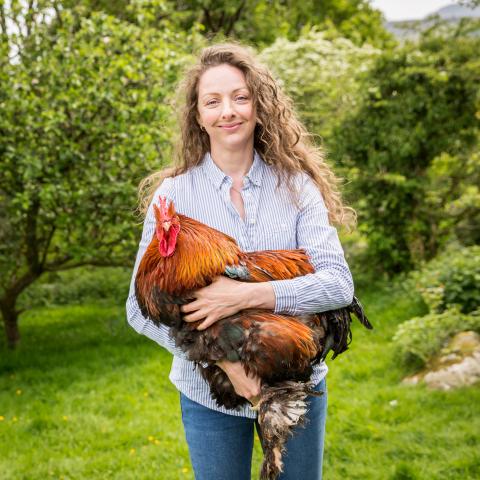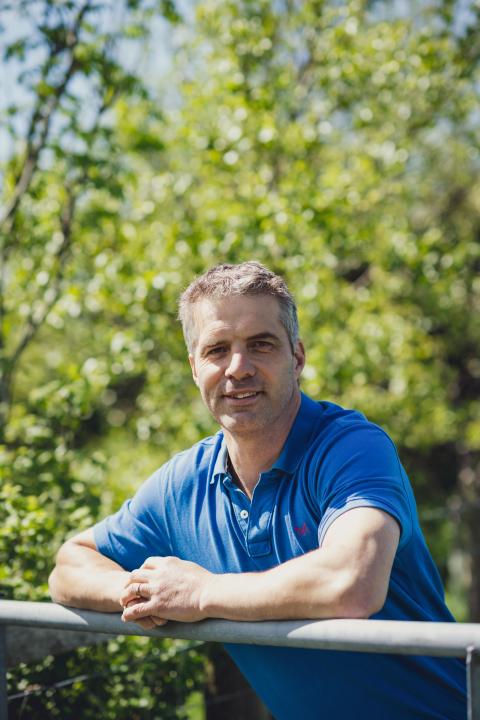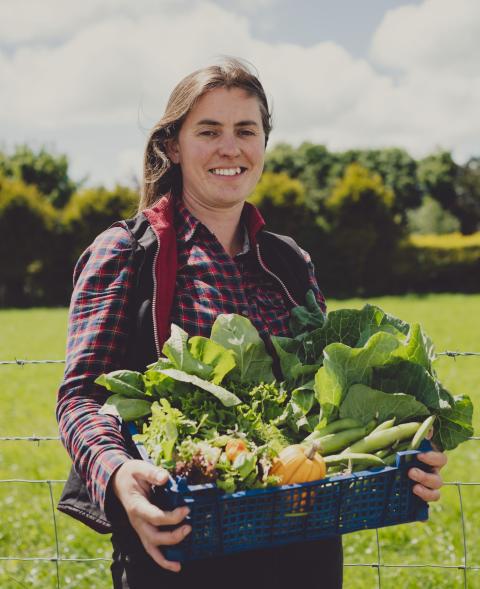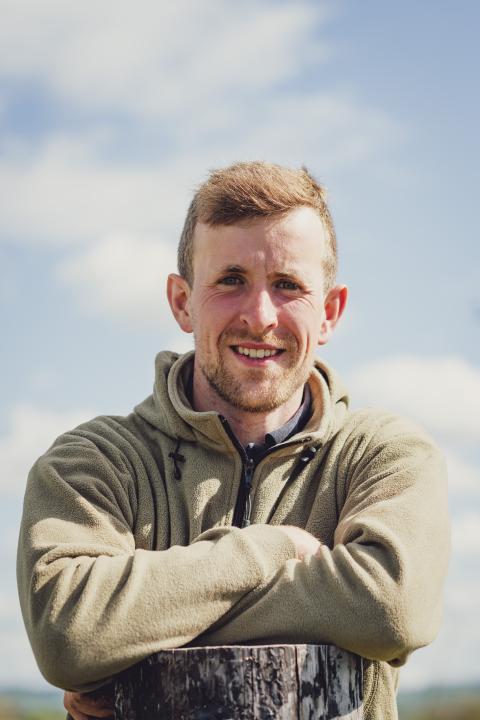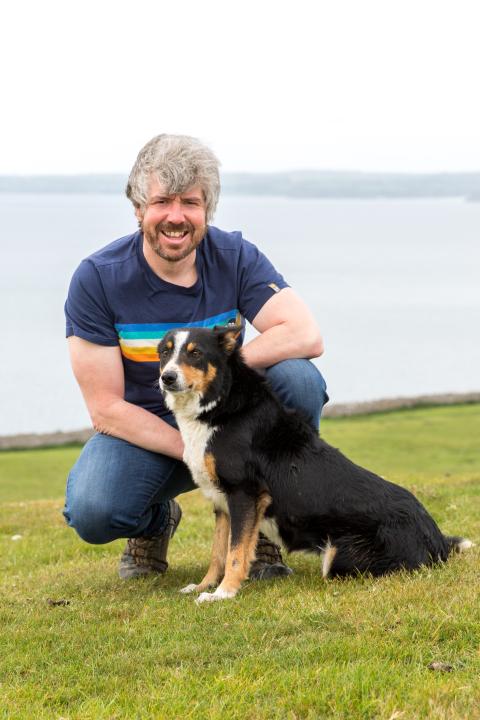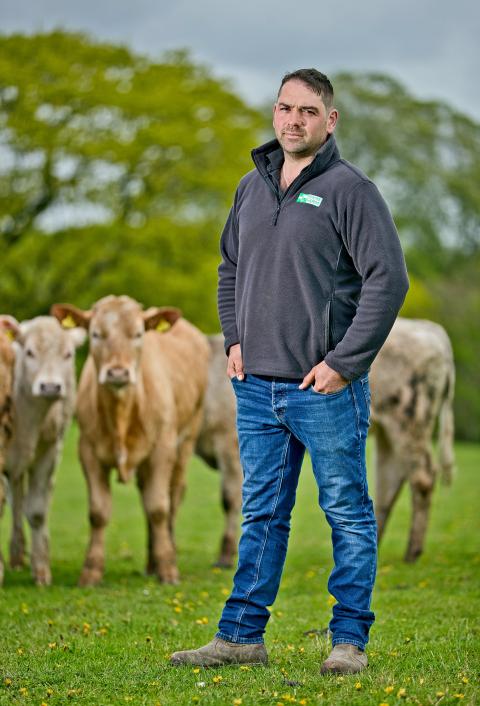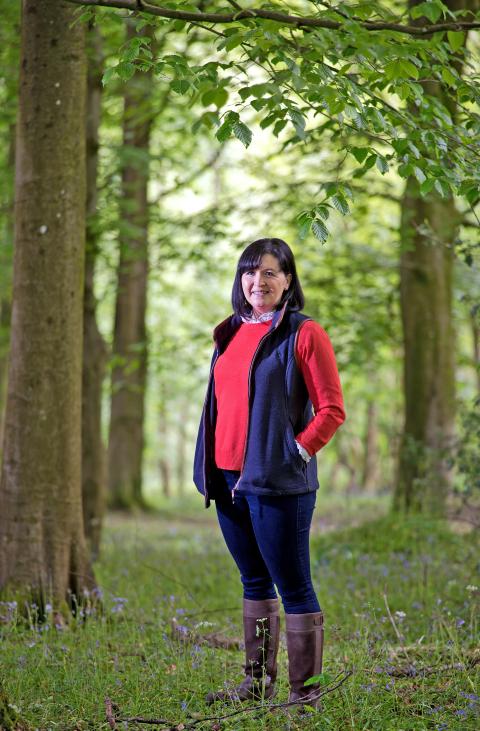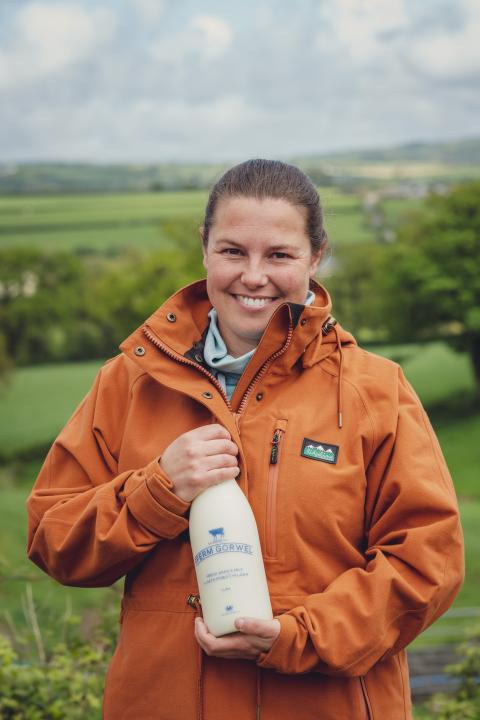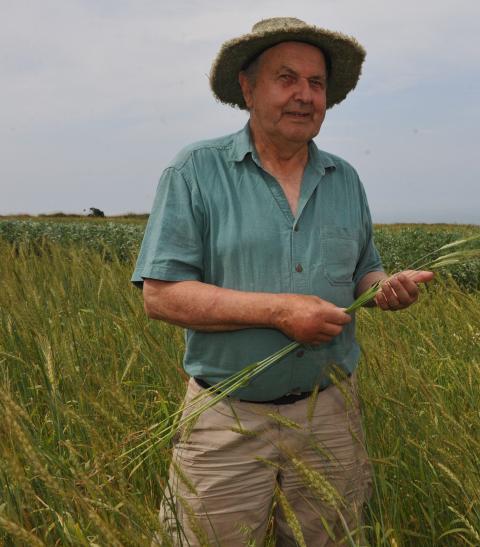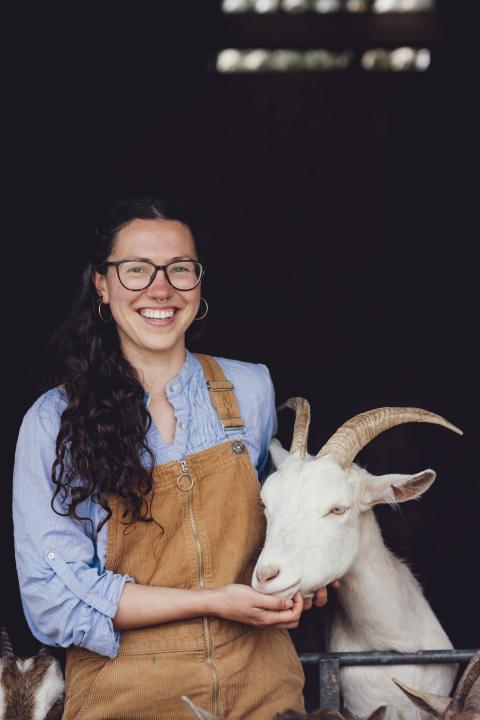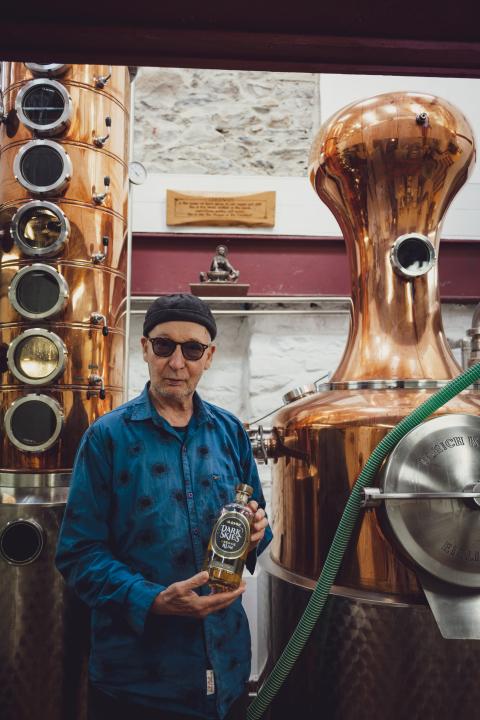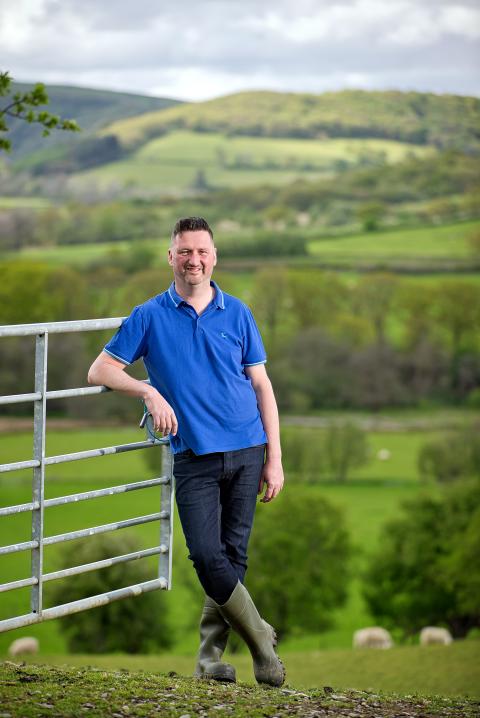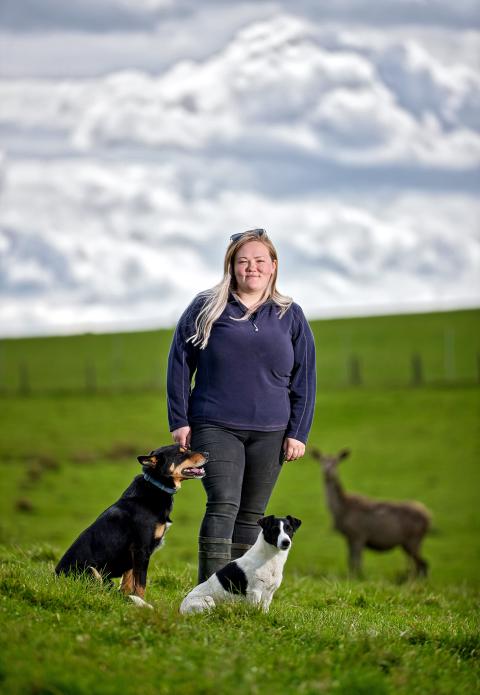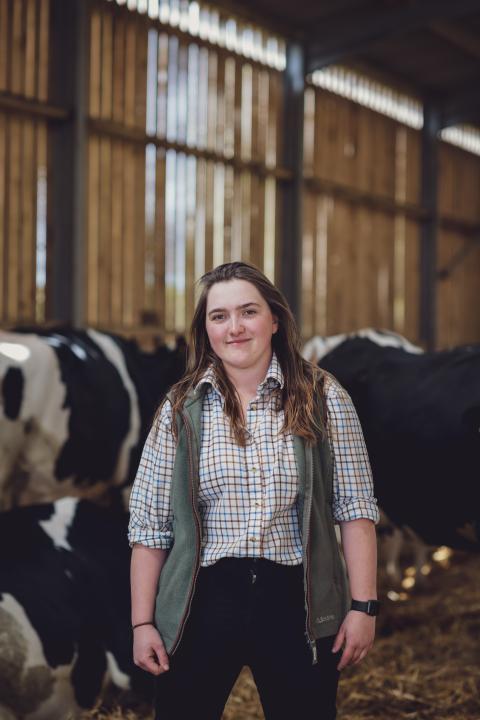21 June 2022
From carbon sequestration to growing heritage wheat varieties and from investigating the potential of a Welsh tea plantation to animal health – these are just a few of the diverse topics to be researched by the 14 candidates selected for this year’s Farming Connect Management Exchange programme.
In a rigorous online selection process, each applicant was asked to explain what they wanted to learn, how they would utilise their new knowledge and where they planned to visit, which this year includes exemplar businesses and universities in the UK, Germany, France, Austria, the Netherlands, Sweden, Poland, Hungary and Latvia.
The judging panel was chaired by Eirwen Williams, director of rural programmes with Menter a Busnes, which alongside Lantra Wales, delivers Farming Connect on behalf of the Welsh Government and European Agricultural Fund for Rural Development, who congratulated this year’s successful candidates.
“The Management Exchange programme encourages farmers and foresters to learn about new or improved ways of working, to access research and see at first hand some of the most successful systems in the farming, food and land-based industries.
“The learning and outcomes already being implemented by many previous Management Exchange candidates augur well for the long-term sustainability and viability of farming businesses in Wales.
“Importantly, the results also bode well for future generations, for the young farmers already working in the industry, whose long-term commitment and loyalty we must nurture, as well as those entering the industry for the first time,” said Mrs. Williams.
The aims of the Management Exchange programme are to enable participants to investigate innovative or more efficient ways of working that will broaden their knowledge, technical ability and management expertise by visiting other successful farming or forestry businesses.
Those selected also have the opportunity to host a suitably trained and experienced farm or forestry manager at their home holding.
Successful participants will be expected to disseminate findings from their learning experience through Farming Connect’s usual communications channels and events programme to ensure their new knowledge is shared with the wider industry.
Detailed information on each of this year’s candidates, where they plan to visit, and what they hope to learn can be found below:
Emma Duffy
Location: Caernarfon, Gwynedd
Destination: UK, Germany, Netherlands
Topic: Chicken gender determination
Bangor University graduate Emma Duffy earned a first-class degree in Biology with Biochemistry. She is an accomplished equine specialist, a fruit and vegetable supplier and now a commercial poultry keeper. The Covid lockdown meant she could not offer private tuition in classical dressage at the small riding school at her family’s 13 acre smallholding near Caernarfon. To compensate, Emma expanded her ‘poultry hobby’ into a new business venture selling both eggs and pullets, which works alongside ‘Village Veg’, the successful fruit and vegetable delivery business started in 2009.
“I plan to visit specialty poultry breeders and in-ovo technology businesses in the Netherlands, Germany and the UK to learn how to apply commercially used poultry-sexing techniques for the preservation of rare breeds.”
Marc Harries
Location: Llandysul, Ceredigion
Destination: Scotland, Germany
Topic: Future proofing the family farm without subsidies
In 2003, former IT systems engineer Marc took over a 180 acre farm in Ceredigion which had been in his wife’s family for two generations. By 2011, he had given up the day job and was a full-time, new entrant farmer. His key focus at the outset was on improving the land and expanding the sheep flock. Today, he’s well on the way to creating a fully-sustainable business for the next generation. The acquisition of two more properties with land, a new PV solar system,biomass boiler and an expanding holiday let business are just the start!
“I want to learn how excess electricity can be stored using battery power; to understand more about agri-voltaics and to investigate whether a community-led energy production system could work in West Wales.”
Naomi Hope
Location: Nevern, Pembrokeshire
Destination: France
Topic: Growing and processing organic herbs for Welsh teas
Naomi, who has a master’s degree in project management, together with her partner Richard, are new entrants to horticulture. They grow a diverse range of organic vegetables from their 10-acre Pembrokeshire smallholding, which they sell through a vegetable box scheme, as well as directly to shops and restaurants. Having researched the market, they feel ready to expand their business model by growing fresh organic herbs, including those which can be made into speciality tea.
“Unlike in France, very few herbs are grown in the UK specifically for teas. Brittany has a similar climate to ours, so my exchange will teach me which varieties to focus on, and I will learn about the cutting, drying, processing and packaging processes.”
Ben James
Location: Lampeter, Ceredigion
Destination: England
Topic: Self-sufficiency for first generation farmers
First-generation farmer Ben rents a 112 acre holding near Lampeter, where he keeps 120 Easycare ewes on an all grass rotational grazing system. A former postman, he gained hands-on experience of farming by working on a dairy farm; contract lambing at local farms and rearing 200 pet lambs he sold for profit. Currently a fencer by trade, he is also a contract worker on dairy farms. Ben’s ultimate goal is to earn his sole income from his own farm business.
“My exchange visit will enable me to meet some of the UK’s top-performing first-generation farmers and learn how and when they achieved that ‘point of difference’ that propelled them into self-sufficiency.”
Dan Jones
Location: Great Orme, Llandudno
Destination: Latvia, France
Topic: Farming, conservation and carbon sequestration
Dan is a tenant farmer at Parc Farm, a National Trust Farm of 150 acres extending to 900 acres of grazing rights on the Great Orme. Dan farms this unique headland, home to rare flora and fauna, in a nature-first way.
Growing up on a family farm on Anglesey, Dan graduated in agriculture and animal science before working as a sheep research technician. He went on to secure his own farm tenancy during which time he worked as a shepherd on Snowdon for a conservation grazing project, and where he found his passion.
“It’s essential that farming, conservation and carbon sequestration work together. Reducing the amount of carbon dioxide in the air is vital in the battle against climate change.”
Tom Jones
Location: Welshpool, Powys
Destination: Scotland
Topic: Factors affecting suckler cow profitability
HCC scholar, Tesco Future Farmer, NFU Next Generation board member and former Farmers Weekly focus farmer Tom Jones wants to create a sustainable future for his young family. The son of an upland sheep and suckler beef farm, Tom’s key focus for his exchange visit is on the efficient production of red meat on a low-cost forage-based system that improves the soil, maintains water quality and enhances the environment. He wants to improve suckler cow profitability through having a better understanding of factors that affect this including genetics, recording/selection systems and grazing management.
“Our goals are to improve the maternal efficiency of the suckler herd to improve both performance and profitability and longer-term, to shift back to native breed cattle.”
Nicola Lewis
Location: Pontyclun, Rhondda Cynon Taff
Destination: Ireland, England
Topic: Developing a silvopasture system and farm education programme
Nicola’s first-class honours degree in environmental sustainability with geography gave her a passion for safeguarding the rural environment. For the last 15 years, she’s worked in regeneration and rural development. Since 2017, Nicola and her husband have been developing the 165-acre farm where they breed Welsh mountain sheep, Welsh Mules and Welsh x Charollais, keeping around 350 sheep on a rotational grazing system. They also have 15 acres of woodland. Having achieved most of their initial business goals, Nicola is ready to investigate diversification opportunities.
“I am keen to learn from farms that have established successful agri-environmental systems and on-farm education opportunities and see how silvopasture contributes to better environmental, economic and educational outcomes.”
Jamie McCoy
Location: Newcastle Emlyn, Ceredigion
Destination: The Netherlands, Austria
Topic: Short supply chains
Agriculture graduate Jamie and her partner purchased a mixed family-owned farm in Ceredigion in 2011. Predominantly a 200 strong block calving dairy enterprise, this entrepreneurial couple have set up other diversified enterprises, despite Jamie having a full-time job within the industry. They pasteurise milk sold through vending machines; have 250 commercial ewes; a PYO pumpkin enterprise, a successful Airbnb venture and a forestry scale wood-chipper supplying biomass. Jamie is determined to improve profitability of the business, while improving its environmental and community legacy.
“We need to add value to milk, meat, vegetables, fibre such as wood and wool and tourism opportunities, so I aim to learn more about short supply chains which operate from the farm gate, to keep ahead of the European curve and meet the ever-changing needs of farmer and consumer.”
Gerald Miles
Location: St.Davids, Pembrokeshire
Destination: France, Austria, Poland, Hungary
Topic: Regen growth of ancient wheat
Gerald Miles, a seventh-generation farmer, together with his son Gerald, runs an organic pasture-fed Belted Welsh Black suckler herd in Pembrokeshire. They also have a flourishing glamping enterprise at their spectacular coastal location. In addition, they grow 20 acres of ancient wheat varieties including Black Oats; Emmer Wheat, Einkorn Wheat; April Bearded and Hen Gymro. Gerald helped set up Wales’ first Community Supported Agriculture group and has joined a ‘Seed Sovereignty’ initiative to safeguard the new wheat varieties against legislation which puts them at risk.
“My exchange will enable me to learn how others have progressed from growing to processing on-farm and supplying artisan bakers. I hope the knowledge I gain will lead to the creation of a farmers’ co-operative and a viable market for Welsh wheat.”
Sophia Morgan-Swinhoe
Location: Bow Street, Ceredigion
Destination: Ireland
Topic: Developing cheese that reflects the farm, its identity and location
First-generation farmer Sophia completed an organic dairy apprenticeship in Norway eight years ago, before moving back home to Wales where she set up her own dairy at a tenanted smallholding. She keeps dairy goats and Jersey cows on a pasture-based rotational grazing system. Calf and kid are at foot, milked once a day. The milk is processed on-farm into small batch products she sells direct. Ambitious to expand the herd and grow her market, her ultimate aim is to process and successfully market a speciality aged cheese.
“By visiting some of the leading farmhouse cheesemakers in Ireland, I will learn how they express the identity of their farms through their produce. My aim is to develop a unique aged Welsh cheese which showcases the herd health and biodiversity of my farm.”
John Savage-Onstwedder
Location: Llandysul, Ceredigion
Destination: Sweden
Topic: Distilling birch tree sap to make alcohol
According to John Savage-Onstwedder, there are thousands of acres of birch trees in Wales, but to the best of his knowledge, nothing is being done with them! John farms a 60 acre organic farm in Ceredigion where he keeps a herd of suckler cows. He is best-known however, for being the founder of Caws Teifi Cheese and the Da Mhile Distillery – two award-winning enterprises that are widely acknowledged for producing flagship products within the Welsh food and drink industry. John is a member of ‘Grŵp Sap Bedw’, set up to investigate the opportunities for harvesting and marketing birch sap.
“My interest in visiting Sweden is to meet with a company which successfully uses birch sap to make alcohol.”
Roland Wear
Location: Llangammarch Wells, Powys
Destination: England, Scotland, Europe
Topic: Setting up a ‘wellbeing’ farm diversification project
A qualified careers adviser with a background in the hospitality industry, Roland combines his part-time role with ‘Big Ideas Wales’ supporting young budding entrepreneurs, with diversifying his traditional eighth-generation hill farm into a sustainable, resilient business he hopes to pass on to the next generation.
Having always been closely involved with the farm, following a family bereavement Roland inherited the flock of traditional breeds that graze on the Epynt Military Range and adjoining common, as well as three lowland closed flocks, all finished on farm and sold as fat lambs.
“My exchange will introduce me to other farmers who have diversified into providing ‘wellbeing’ enterprises, offering alternative accommodation focusing on ‘eco-friendly ‘and holistic therapies connected with a natural lifestyle.”
Rebecca Williams
Location: Llandrindod Wells, Powys
Destination: UK
Topic: Marketing red meat directly to consumers
Young farmer Rebecca Williams is a business partner at her family’s 400 acre upland farm where she has worked for the last five years. The family keep 24 Welsh Black cattle, 700 sheep and 84 red deer. This year, Rebecca is sending her first group of deer fawns to a major retailer. Involved in both the Farmers Weekly Apprentice scheme and the Tesco Future Farmer Foundation, she has an appetite for learning, and plans to utilise her exchange visit to learn all she can about marketing and adding value to red meat.
“Efficiency and profitability are two key drivers for me, so I want to learn from farmers who successfully process and market their produce directly to consumers.”
Lottie Wilson
Location: Haverfordwest, Pembrokeshire
Destination: University of Nottingham, University of Liverpool
Topic: Detection, prevention and management of dairy lameness
Lottie is a first-year agriculture student at Nottingham University. Having grown up at her family’s 650 acre dairy farm near Haverfordwest and through a year working in the industry during her foundation studies at Hartpury College, she has plenty of hands-on experience. Her family have a 300 head Holstein Friesian all year-round calving herd and operate a semi- intensive system, grazed around six months of the year.
“Poor foot health is a major contributor to cattle performance, which can lead to reduced fertility, yield and longevity. By shadowing some of the industry’s leading academics in this field, I aim to learn more about issues including digital dermatitis, antibiotic use, and management techniques to improve lameness rates.”

